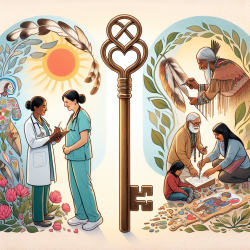Introduction
The Muskowekwan First Nation (MFN) in Saskatchewan, Canada, stands as a testament to resilience and cultural preservation amidst the historical trauma of colonialism. The community's experiences with the Muskowequan Indian Residential School (MIRS) have left deep-seated impacts, but their journey towards healing provides invaluable insights into integrating cultural responsiveness and equity in healthcare.
Research Overview
The research titled From trauma to resilience: advancing cultural responsiveness and equity in the Muskowekwan First Nation’s healing journey employs a community-based participatory research framework. It highlights the importance of community input in shaping healing processes, emphasizing spiritual and cultural practices as vital components of recovery.
Key Findings
The study underscores several critical outcomes:
- Cultural Practices as Healing Tools: The MFN community's commitment to spiritual and cultural practices emerged as essential for healing. Engaging in these practices fosters a sense of identity and belonging, crucial for overcoming historical trauma.
- Holistic Health Approaches: The integration of traditional wisdom with contemporary health practices is vital. This holistic approach addresses mental, physical, emotional, and spiritual health, aligning with Indigenous views on wellness.
- Community-Driven Initiatives: The grand opening of the MFN Family Healing and Wellness Centre symbolizes a significant step forward. It embodies a model of community-driven engagement, ensuring programs are culturally tailored and responsive.
Implications for Practitioners
For practitioners looking to improve their skills and outcomes in working with Indigenous communities, this research offers several actionable insights:
- Embrace Cultural Responsiveness: Understanding and integrating cultural practices into therapeutic interventions can enhance engagement and effectiveness. Practitioners should seek to learn from and incorporate traditional healing methods alongside modern techniques.
- Foster Community Partnerships: Collaborating with community leaders and members ensures that health services are relevant and respectful of cultural contexts. This partnership can lead to more effective and sustainable health outcomes.
- Promote Holistic Wellness: Recognizing the interconnectedness of various health aspects is crucial. Practitioners should advocate for and implement holistic health models that address the full spectrum of well-being.
Encouragement for Further Research
While this study provides a robust framework, further research is needed to explore the long-term impacts of culturally integrated health programs. Practitioners are encouraged to engage in research that continues to build on these findings, contributing to a deeper understanding of how cultural responsiveness can be effectively implemented in diverse settings.
Conclusion
The Muskowekwan First Nation's journey from trauma to resilience offers a powerful example of how cultural responsiveness and equity can transform healthcare outcomes. By integrating traditional practices with contemporary health models, practitioners can contribute to healing and empowerment within Indigenous communities.
To read the original research paper, please follow this link: From trauma to resilience: advancing cultural responsiveness and equity in the Muskowekwan First Nation’s healing journey.










